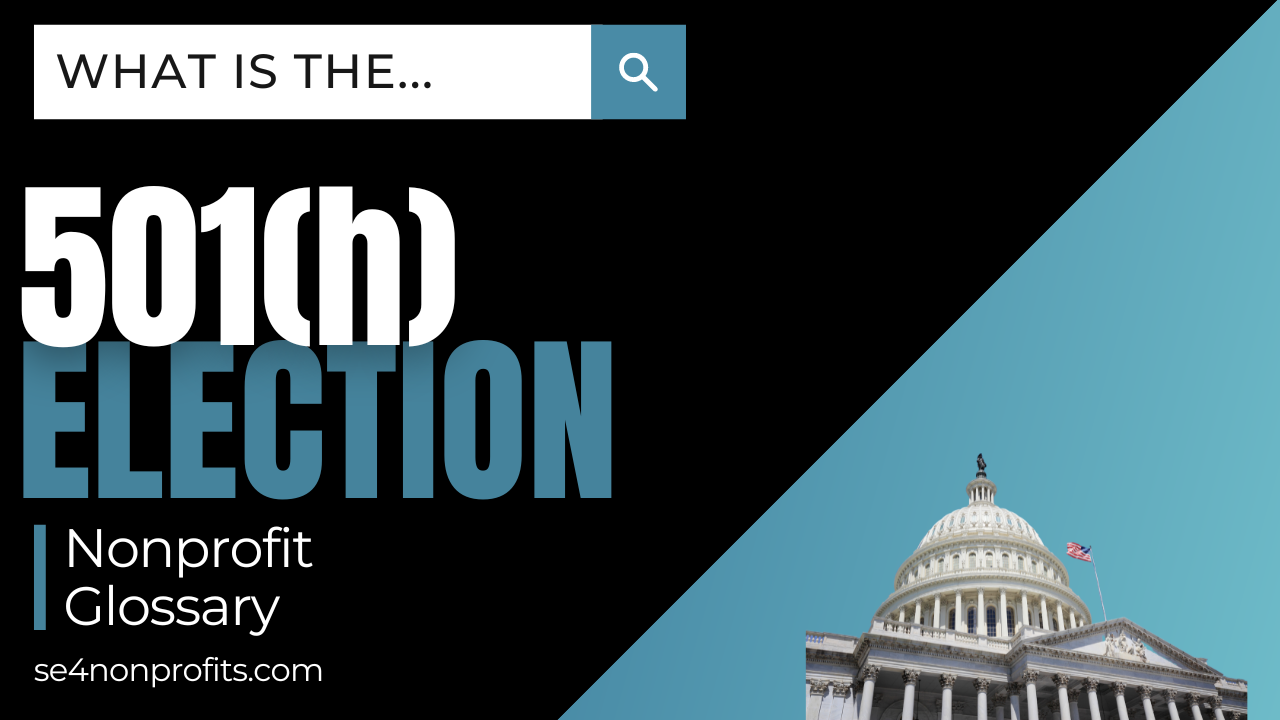
Blog.
Most Recent Posts

VIDEO: What is the 501(h) Election? | Nonprofit Glossary
SE4N's Benjamin Takis provides a short summary of the 501(h) election, how it affects the lobbying limits applied to 501(c)(3) nonprofit organizations, how the 501(h) "expenditure test" is different from the "no substantial part" test, and how a public charity makes the 501(h) election.

Q&A #152 – What happens if a 501(c)(3) public charity exceeds the 501(h) lobbying limits?
501(c)(3) public charities are permitted to engage in “lobbying” up to certain limits. Organizations that make the “501(h) election” are subject to a more concrete set of limits based solely on expenditures made by the organization for lobbying purposes. If an organization exceeds these limits in any one tax year it will have to pay a 25% tax on the excess. A 501(h)-electing organization’s tax-exempt status will not be revoked unless its lobbying expenditures exceed 150% of the limits over a 4-year period.

Q&A #141 – Does a grant recipient’s lobbying count towards the grantor’s lobbying limits?
A grant to an organization that engages in lobbying may count towards the grantor’s lobbying limits, depending on how the grant is structured and the tax-exempt status of the grantee. In summary, grants to a 501(c)(3) organization generally do not count towards the grantor’s lobbying limits unless specifically earmarked for lobbying activities, while grants to a non-501(c)(3) organization do not get this treatment unless structured to meet the requirements of a “controlled grant.”

Q&A #75 – Are there advantages to 501(c)(4) status compared to 501(c)(6) status?
Both 501(c)(4) and 501(c)(6) organizations are permitted to engage in unlimited amounts of lobbying so long as the lobbying is consistent with the organization’s tax-exempt purposes. The main advantage of 501(c)(4) status as compared to 501(c)(6) status is that there is more flexibility with regard to the organization’s governance structure. However, there are some downsides that should also be considered.

Q&A #30 – Can a 501(c)(3) organization engage in advocacy related to state ballot initiatives?
Assuming your organization is a 501(c)(3) public charity (rather than a private foundation) you are generally free to engage in advocacy related to state ballot initiatives, up to certain limits. This is because advocacy related to referenda, ballot initiatives, constitutional amendments, and similar procedures is generally considered a form of “lobbying” on legislation, rather than a political campaign activity.

Q&A #29 – Can the executive officer of a 501(c)(3) organization express personal opinions about the election without endangering the organization’s tax-exempt status?
Yes, it is your right as an individual to speak about the election in your personal capacity, and the Internal Revenue Code prohibition against political campaign intervention by 501(c)(3) organizations is “not intended to restrict the free expression on political matters by leaders of organizations speaking for themselves, as individuals” (see IRS Rev. Rul. 2007-41). However, you will need to be careful to avoid speaking in a way that could be attributed to the organization.

Q&A #28 – Can a 501(c)(3) organization engage in public advocacy related to Supreme Court appointments?
The answer is generally yes, 501(c)(3) organizations are allowed to advocate for or against the appointment of Supreme Court Justices. However, you must be very careful in your communications not to cross the line into endorsing or opposing a candidate for public office in the process. This can be tricky because the line between permissible and prohibited activity is very hazy.

Q&A #27 – Can a 501(c)(3) organization have a political candidate speak at its virtual conference?
The safest approach for a 501(c)(3) organization is to avoid having political candidates (or their staffers/surrogates) speak at any organization event, whether virtual or in-person, particularly when the event is so close to an election. There are certain circumstances where this could be allowed, but these circumstances are limited and always subject to a “facts and circumstances” gray area.